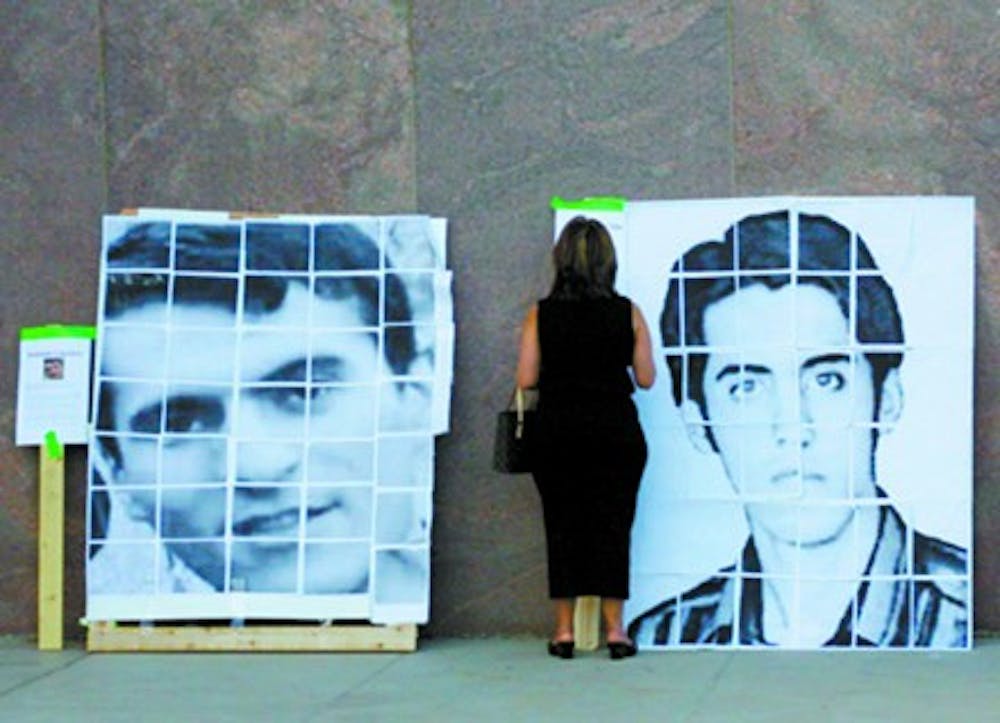Around 100 protesters gathered on the lawn of the state Capitol Saturday for the anniversary of the alleged fraudulent election in Iran on June 12, 2009.
Last year, protests broke out in Iran due to a widely held belief that the presidential election was rigged. With high voter turnout and long lines at polling sites, voters in support of candidate Mir Hossein Mousavi, who was running against Iranian President Mahmoud Ahmadinejad, predicted the election would be close, according to a BBC report. But when Ahmadinejad garnered almost 63 percent of the vote, Iranians took to the streets. The Associated Press reported that somewhere between 36 and 72 people were killed in the post-election violence.
Protesters at the capitol said there are human rights violations in Iran, including rape and other abuse and imprisonment due to the protests, and there is no freedom or democracy because the election was rigged.
Renee Behinfar, one of the organizers for the Capitol protest, is also a co-founder of the Arizona chapter of Democracy and Freedom for Iran.
“We’re holding [the protest] on this day to bring international attention again to the fact that there are still ongoing human and civil rights violations that are transpiring in Iran,” Behinfar said.
There were 87 cities around the world that protested overall, according to the Web site 12june.org, which is dedicated to the election and resulting protests.
During the protest, the group sponsored 11 prisoners of conscience, which refers to people who are imprisoned due to beliefs and other reasons even though they have not practiced violence and “who are currently imprisoned in Iran in some of the worst conditions there,” Behinfar said.
She said the group is campaigning for the release of the prisoners, and there were postcards available to be sent to embassies to “advocate for their release and to just call attention to their case.”
Her group has held around eight or nine protests since last year with no planned protests yet for the future.
There is a large Iranian community in Arizona, she said, and the United States government should be doing more about the controversy.
“I think they need to speak louder in terms of condemning the ongoing civil rights violations in Iran and do something to hold the regime accountable for these acts,” Behinfar said.
She said Iranians need to continue to fight for freedom and democracy.
“This is supposed to be a nonviolent demand of freedom and democracy,” said Amir, an ASU student and event coordinator who wished to remain anonymous because of his status as an Iranian citizen. Amir said he often travels to Iran to see his family, and his involvement in the protests could jeopardize that.
“The only thing that we can do is to just gather every now and then and to show our support to the people,” Amir said.
He said there was a rally last year at ASU’s University Bridge a few days after the election and about 500 to 600 people showed up.
“If we keep on doing this, someday it’s going to work out,” he said.
Akbar Atri, one of the founders of an e-learning Web site for Iranian civil society, www.tavaana.org, was a speaker at the protest.
“We are here to be the voice of people who are oppressed and imprisoned by [the] Islamic Republic in Iran and to show our solidarity with those people and support them,” Atri said.
He said he came to the U.S. in 2005 after being invited to a conference, and stayed to avoid going to jail for holding views against the government in Iran.
“Most of the people [that] are in prison are my close friends,” Atri said.
Mariam Memarsadeghi, an activist and a founder and director of tavaana.org, is married to Atri and spoke at the event.
“I’m a U.S. citizen but always feeling like the rights and privileges that we have here as Americans are the things that the Iranians back home are struggling for,” Memarsadeghi said.
She said Iranian-Americans have a civic duty to both countries and to be a voice for those in Iran who are trying to break free from religious tyranny.
She said Iranians are becoming more connected as a result.
“The level of technology used by Iranians and the kind of discourse about democracy and human rights is something that can only get stronger now,” she said. “The people’s voice can only become louder and the regime’s control by repression can only fail in time.”
She said it’s inevitable that Iran will become a free country and that she’s hoping to speed up the process.
Roya Hosseini, a 17-year-old at Xavier College Preparatory, said she was in Tehran, Iran, during the election and saw the protests, but her father wouldn’t let her protest because it was dangerous.
“It was really tense being there,” Hosseini said. “I remember in the days after there’d be besieging militia all around, like literally on every street. It’s really nerve-racking when you’re walking and you want to be relaxed but you can’t.”
Reach the reporter at reweaver@asu.edu





